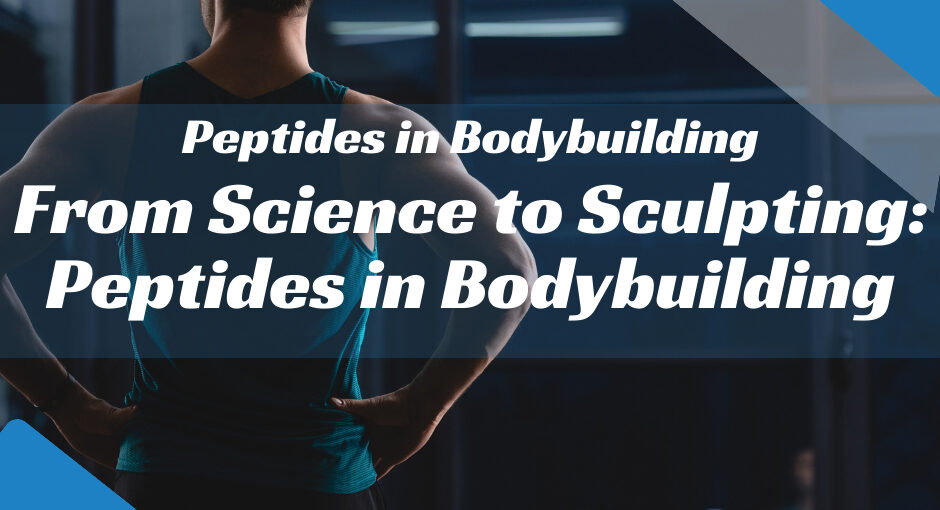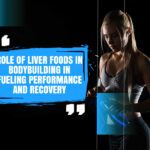What is Peptide’s Bodybuilding?
When discussing the world of fitness, the term “Peptides Bodybuilding” often comes up as a buzzword that sparks curiosity and interest. But what does it really mean? Simply put, peptides are short chains of amino acids that play a crucial role in various bodily functions, including muscle growth and fat loss. They offer a powerful way to enhance your bodybuilding journey, making them an increasingly popular choice among fitness enthusiasts and professional bodybuilders alike.
Importance of Peptides in Bodybuilding
So, why are peptides so significant in bodybuilding? The benefits they provide can be a game changer for those looking to achieve their fitness goals. Here are a few points that outline their importance:
- Muscle Growth: Peptides can stimulate the release of growth hormones, which are essential for muscle growth. Many users have reported noticeable gains in muscle mass when incorporating peptides into their routine.
- Fat Loss: Certain peptides are known for their fat-burning capabilities. They can help you shed unwanted body fat while preserving muscle, which is a crucial aspect of any bodybuilding regimen.
- Improved Recovery: After an intense workout, your muscles need time to repair. Peptides accelerate healing, minimizing downtime and allowing you to train harder and more frequently.
- Enhanced Performance: Peptides help to increase stamina and endurance, allowing you to push through those last challenging reps or extended cardio sessions. They have been likened to a natural booster for athletic performance.
- Increased Protein Synthesis: This enhances your body’s ability to utilize the protein you consume, leading to more effective workouts and results.
Imagine a time when you felt like you were hitting a plateau in your training. Perhaps, despite diligent efforts in the gym and a solid diet, your gains seemed minimal. This is where peptides could step in. For instance, a friend of mine hit a wall in his training. After researching peptides, he decided to give them a chance. Months later, he was not only lifting heavier but also seeing better-defined muscles—a testament to the role peptides played in revitalizing his bodybuilding routine.
In summary, peptides are essential for anyone serious about bodybuilding. They provide a multifaceted approach to gaining muscle, losing fat, and recovering quickly. As with any supplement, it’s important to do thorough research and consult with a healthcare professional before diving in. But if used correctly, peptides can undoubtedly help elevate your training to new heights.
Science Behind Peptides
As we dive deeper into the fascinating world of peptides in bodybuilding, it’s important to understand the science that underpins how these powerful compounds work in the body. Knowing this can help you make informed decisions about including them in your routine and maximizing your fitness journey.
How Peptides Work in the Body?
At its core, peptides are short chains of amino acids linked by peptide bonds. When they’re introduced into your body, they interact with specific receptors, triggering various biological responses. Here’s a simplified breakdown of how it works:
- Signal for Growth: Peptides can stimulate the pituitary gland, which releases human growth hormone (HGH). This hormone is crucial for muscle growth, fat metabolism, and overall physical performance.
- Cell Regeneration: They promote the healing of tissues and cells in the body. When your muscles undergo stress during workouts, peptides signal the body to regenerate and repair those tissues.
- Increased Blood Flow: Many peptides boost nitric oxide production, enhancing blood circulation. Improved blood flow means better nutrient delivery to muscles, promoting growth and recovery.
Consider this: if you’ve ever taken a quality pre-workout supplement, the rush of energy you feel is akin to what some peptides can provide. They enable your body to perform at its peak, transforming how you handle your workouts.
Different Types of Peptides Used in Bodybuilding
There are several types of peptides that bodybuilders often consider, each with unique benefits. Here are a few popular ones:
- Growth Hormone-Releasing Peptides (GHRPs) promotes the natural release of HGH, fostering muscle growth and recovery.
- Insulin-like Growth Factor 1 (IGF-1): Known for its ability to enhance muscle size and strength, IGF-1 also aids in the recovery process.
- Collagen Peptides: While not directly related to muscle growth, they help strengthen connective tissues, reducing injury risk and speeding up recovery times.
- Thymosin Beta-4: This peptide helps in tissue repair and inflammation reduction, making it excellent for athletes who push their limits.
- CJC-1295: Often used for its anti-aging properties, this peptide works similarly to GHRP but has a longer-lasting effect on HGH levels.
By understanding how peptides work and the different types available, you can make more educated choices tailored to your bodybuilding goals. Whether it’s building muscle, enhancing performance, or speeding up recovery, incorporating the right peptides could be a significant step in achieving your fitness aspirations. So, as you gear up for your next workout, consider how these scientific marvels can be allies in your bodybuilding journey!
Benefits of Peptides in Bodybuilding
Now that we’ve explored the science behind how peptides work in your body, it’s time to delve into the concrete benefits they can bring to your bodybuilding routine. From muscle growth to enhanced performance, peptides are proving to be a valuable addition to many athletes’ training regimens.
Muscle Growth and Repair
The main goal in weightlifting is often to build bigger muscles. Proteins called peptides play a big role in this area. By encouraging the release of growth hormones, they make the body’s setting perfect for muscle hypertrophy, which means building muscle.
Growth hormones are important for growing muscle, and peptides like GHRPs are known to make them come out. Peptides can also speed up protein production, which lets the body use dietary protein more efficiently for muscle repair and growth, especially after hard workouts when muscle fibers are microtears. Peptides can also help muscles heal faster, which means you can train more often and break up your workouts more quickly.
One of my gym friends had trouble with delayed-onset muscle soreness (DOMS) after hard leg days. After some study, he added a certain peptide to his routine that was meant to help him recover. Within a few weeks, he felt a lot less pain and was able to get back to muscle training more quickly. The results are clear proof that peptides can help muscles heal.
Improved Athletic Performance
Athleticism and strength are important parts of bodybuilding. Peptides can improve your ability and help you push yourself during training in many ways.
Researchers have found that some peptides can improve stamina, which means that people can do longer workouts without getting tired. Having them can help you keep up your energy during hard workouts.
Peptides have also been shown to help muscles grow and recruit new ones. They make you stronger and allow you to lift heavier weights during workouts.
Some peptides also help your brain, which means you can focus and think more clearly while you work out. It can help you do better generally by making you more mentally present and motivated.
The feeling of “runner’s high” is one that many people can relate to. Many people who have tried peptides have said that they gave them similar bursts of energy and drive during their workouts. They were pushing themselves to do workouts that they used to find hard, which led to big gains in the end. In conclusion, peptides have many large and useful benefits in weightlifting. They not only help muscles grow and heal, but they also make athletes perform better than ever. If you want to reach your exercise goals, adding peptides to your routine might be the key to reaching your full potential.
Peptides in Recovery
Following a solid workout, the next crucial phase in your bodybuilding journey is recovery. It is where peptides really shine, playing a vital role in helping your body bounce back and prepare for the next round of training. Let’s explore how peptides enhance your recovery process and facilitate muscle healing.
Role of Peptides in Post-Workout Recovery
After you’ve pushed yourself to the limit in the gym, your muscles need care and attention to repair and grow. Peptides can provide that edge in your recovery routine. Here are some of the primary roles they play:
- Accelerated Muscle Repair: Peptides such as BPC-157 have been shown to speed up muscle recovery significantly. They promote the regeneration of muscle fibers, allowing you to get back to your workouts sooner.
- Reduced Inflammation: Intense exercise can cause inflammation in the muscles, causing soreness and discomfort. Peptides help mitigate that inflammation, leading to a quicker return to performance levels.
- Improved Nutrient Absorption: Peptides enhance blood flow during recovery, which means nutrients are delivered to muscles more efficiently. It is crucial for giving your body what it needs to heal and rebuild.
One fitness enthusiast I know found himself sidelined by soreness after trying high-intensity interval training (HIIT) for the first time. Feeling frustrated, he added peptides aimed at recovery to his post-workout routine. Not long after, he was amazed by how quickly his body rebounded from those intense sessions, enabling him to stay consistent with his workout plan.
Enhancing Muscle Healing with Peptides
To get the most out of your workouts, you need to let your body heal afterward. Peptides can speed up muscle repair in several ways.
Do you know that peptides can be very important in keeping your muscles and joints healthy? They can make your body make more collagen, which is important for keeping your joints and connective parts healthy. Bodybuilders who put a lot of stress on these places will benefit the most from this. Peptides can also help keep people from getting hurt by making the body a better place to heal and speeding up muscle repair. It means that people can train harder without worrying about failing. In addition, peptides can help with general recovery by balancing hormones, making sleep better, and even improving mood, all of which are important for getting enough rest.
To sum up, adding peptides to your recovery process after a workout can have huge benefits that help you train smarter and harder. Your body will recover faster and heal muscles better, which will not only help you do better in your workouts but also set you up for long-term success on your bodybuilding journey. So, as you think about how to heal, remember how powerful peptides could be!






